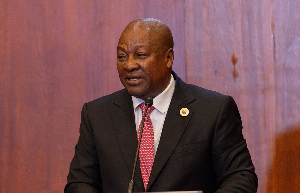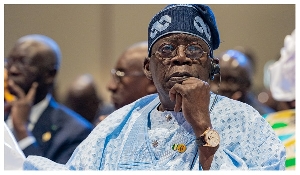Opinions of Thursday, 4 July 2013
Columnist: Okoampa-Ahoofe, Kwame
What Is The Purpose Of This Story?
By Kwame Okoampa-Ahoofe, Jr., Ph.D.
The Ghanaweb.com's General News section edition of June 25, 2013 contained a brief news item sensationally captioned, "Market Fires: Court Refuses To Hear Arsonists Case." I was a bit taken aback by the caption of the article but was not the least bit surprised. It was quite predictable that the article, sourced to Citifmonline.com, would carry such a sensational no-news article.
After all, is this not the court-muzzling regime of the so-called National Democratic Congress (NDC), the very party and government whose ideological forebear, the so-called Provisional National Defense Council (PNDC), founded and chaperoned by the same Chairman Jerry John Rawlings, on June 30, 1982, summarily abducted three Ghanaian high court judges from their several homes in the thick of darkness, and had them brutally executed, Mafia-style, on the Bundase Military Range on the Accra-Plains. Of course, I haven't forgotten the equally brutal abduction and execution of Maj. Sam Acquah by goons selected and dispatched for the purpose by Messrs. Rawlings and Kojo Tsikata, the former's clansman and clinically murderous National Security Advisor.
The irony of the Tsikata appointment is that it spanned the most politically, culturally and economically unstable and insecure twenty-year period in the postcolonial history of the country. We must also promptly underscore the widely known fact that in Mr. Tsatsu "The Thief" Tsikata, cousin to the National Security Advisor, Capt. Kojo Tsikata had a suave and equally murderous operative who provided the "intellectual justification" for the patently anti-Akan ethnic-cleansing pogrom or Mini-Holocaust. This, of course, is not in any way to downplay the sanguinary gravity of Mr. Rawlings' reign-of-terror that completely palled the Ghanaian political landscape between 1982 and 1992, when the former Chairman Rawlings deviously morphed himself - chameleon style - into the first military dictator in the country's annals to be twice "elected" to the Fourth-Republican presidency.
Well, the obvious implication here, of course, is that the Citifmonline.com article was likely composed and disseminated by a National Democratic Congress partisan intent on making the judiciary seem like the number one enemy of the Mahama government. Now, couple the foregoing observations with the recent horrid declaration by President Mahama that his is a veritably divinely preordained presidency, and the primary intent of the anonymous reporter of viscerally intimidating the hell out of the Ghanaian judiciary could not have been depicted more eerily and poignantly.
On the latter score, the reporter takes cynical pains to vindicate Mr. Mahama for publicly swearing that, indeed, the bulk of the recent market fires were the deliberate act of arsonists, and not a natural occurrence. Couple the preceding also with the public assertion by quite a remarkable number of prominent Mahama-government operatives that very likely arsonists with New Patriotic Party sympathies torched the various markets scattered all over the ten regions of the country, and the knavish anti-judicial angle to the story could not be more heinous.
In the end, having cynically and deviously prejudiced the minds of its audience against the country's judicial system - of course, I hope such vicious propaganda had been miscalculated - the Citifmonline.com reporter smirkingly informs her/his readers that, after all, it was only a district magistrate's court at Adjabeng to which personnel from the Greater-Accra Regional Police CID had collared two of three arson suspects.
In sum, what had just occurred was a gross exhibition of incompetence on the part of the police headquarters' CID personnel. These apparently nominal police officers ought to have taken the arson suspects to a court of higher jurisdiction or judicial authority but chose not to, either out of sheer laziness (a quite common occurrence) or plain professional incompetence.
What is interesting, though, is that what is at stake, here, for the reporter and his/her paymasters/-mistresses is not about the apparent subject of reportage at all, but simply to create rank judicial disaffection in the minds of the Ghanaian public and obliquely hope that the Wood Court is paying sedulous attention. This is what the new Ghanaian journalistic praxis that Justice William Atuguba has been bitterly decrying is squarely about.
________________________________________________________
*Kwame Okoampa-Ahoofe, Jr., Ph.D.
Department of English
Nassau Community College of SUNY
Garden City, New York
June 26, 2013
E-mail: okoampaahoofe@optimum.net
###














